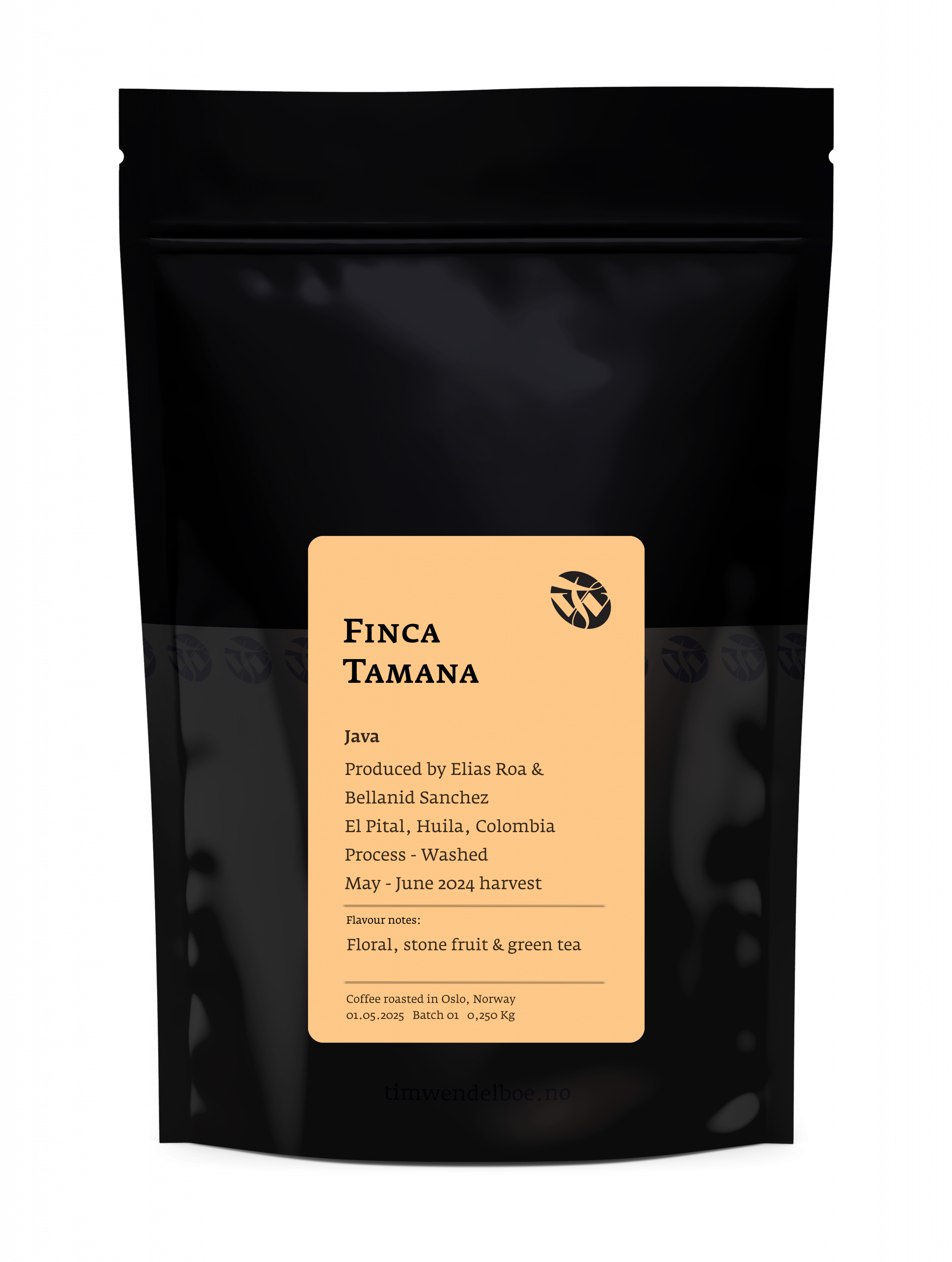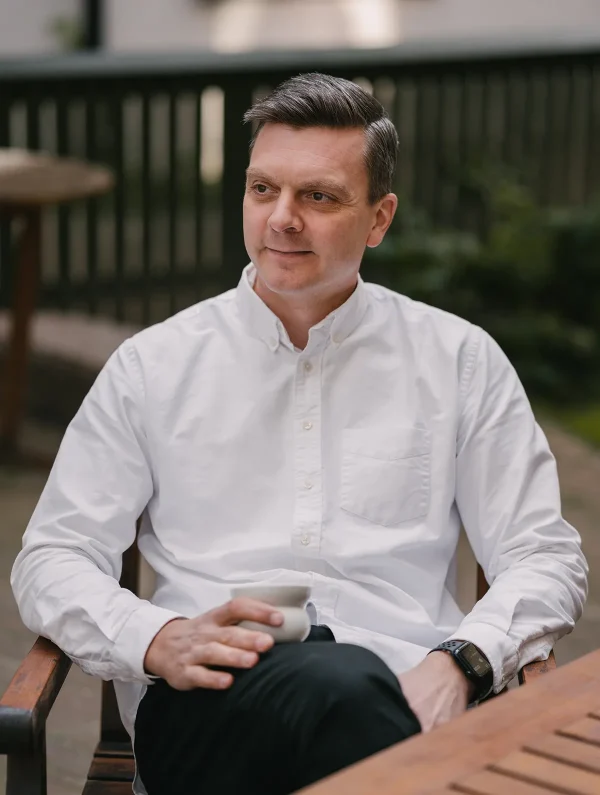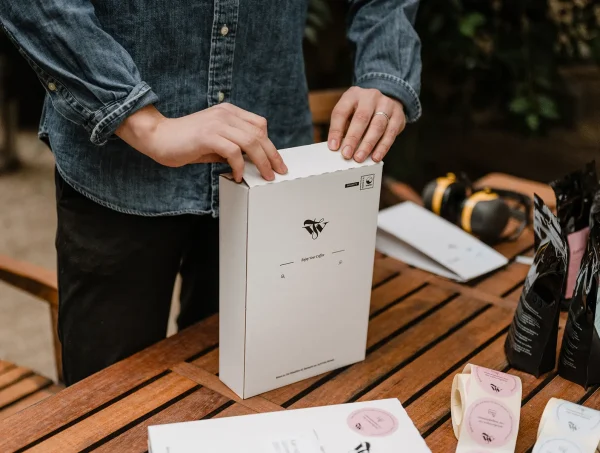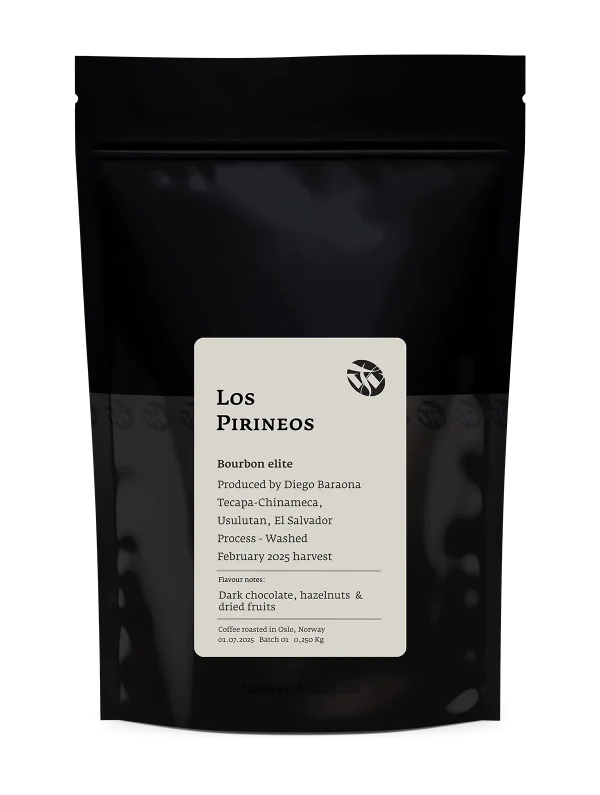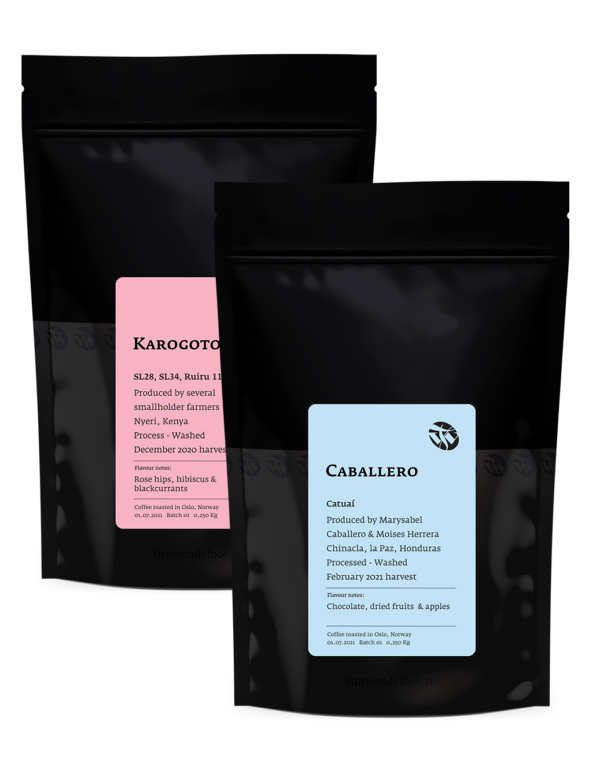| Cultivar | Java |
|---|---|
| Flavour Notes | Floral, stone fruit & green tea |
| Producer | Elias Roa & Bellanid Sanchez |
| Country | Colombia |
| Region | El Pital, Huila |
| Process | Washed |
| Harvest | May – June 2024 |
| Roast Profile | Light Roast |
| Contents | Whole Coffee Beans |
| Bag Size | 250g |
Finca Tamana Java
kr239.00
This Java from Finca Tamana has delicate floral and green tea like flavours with hints of stone fruit.
Out of stock
Additional information
Tim's Notes
I planted seeds of the Java cultivar together with Elias and Bellanid some years ago as an experiment to see if the coffee would taste good on their farm.
Java is often called «Geisha’s little sister» as it can be quite delicate and floral in its flavour profile. However I have tasted several Java coffees in the past that are quite ordinary to say the least, but the Java from Finca Tamana has thasted super sweet, floral and delicate like green tea in the past two harvests. It is now among my favourite coffees from this farm and we have asked Elias and Bellanid to plant more of it so we can get more in the future.
Java is often called «Geisha’s little sister» as it can be quite delicate and floral in its flavour profile. However I have tasted several Java coffees in the past that are quite ordinary to say the least, but the Java from Finca Tamana has thasted super sweet, floral and delicate like green tea in the past two harvests. It is now among my favourite coffees from this farm and we have asked Elias and Bellanid to plant more of it so we can get more in the future.
Cultivar
Java is quite rare to find in Colombia despite that it pcan produce high quality coffee with low inputs and is tolerant to leaf rust.
It was first introduced to the island of Java in Indonesia, directly from Ethiopia and is therefore genetically an Ethiopian landrace cultivar.
In recent years it has made its way to Latin-America where it is often described as "Geishas little sister" due to its delicate and sometimes floral flavour profile.
Process
Picking and sorting
Depupling, fermenting & washing
Drying
- The coffee is selectively hand picked by hired pickers under supervision of Elias. Cherries are hand-sorted before they are processed to make sure only ripe cherries are processed together.
Depupling, fermenting & washing
- The coffee cherries are stored in the cherry hopper in open air over night before the coffee is de-pulped in the morning. After de-pulping, the parchment coffee with the mucilage on is fermented for 24 hours in clean stainless steel tanks. The fermentation is stopped when the mucilage is easy to clean off and before the coffee flavour is influenced by negative fermentation flavours. The coffee is then washed in clean water by using an eco-mill which is a mechanical mucilage remover. The eco-mill reduces water waste from the average 50-100 litres of water per kilo of coffee with traditional washing methods to only 0,5 – 1 litre per kilo. After washing the coffees are soaked for 24 hours in clean water in tiled cement tanks. All floaters (beans with low density) are removed during the washing and soaking process.
Drying
- After the soaking stage the clean parchment coffee is dried in parabolic dryers and drying beds covered with shade nets to prevent the beans from over heating. The coffees are raked throughout the day to ensure even drying. Drying normally takes from 20 to 30 days and once the moisture content is below 11% it gets packed and stored in air tight grain pro bags. All our coffees from Finca Tamana are vacuum packed before it is shipped to Norway.
Shipping
For our Norwegian customers, we offer three shipping options:
- Pakke i Postkassen - With Pakke i Postkassen, tracking is provided, and delivery is estimated within 2-3 business days.
- Pakke til hentested - The parcel can be collected from a Post in Store, Post Office, parcel locker, or parcel box. This option includes tracking, with delivery expected within 1-5 business days.
- Norwegian Post, No Tracking (Brevpost) - This option does not offer tracking. Delivery is estimated within 2-5 business days.
How To Brew
Filter
- We strongly recommend using the correct measurements and brewing techniques when you brew our coffees. Use a digital scale both to measure water and coffee in order to get consistent results, and we recommend using between 60 to 70 grams of coffee per litre (1000g) of water, depending on the brewing method, water quality and coffee used.
- We strongly recommend using VST filter baskets. Both the 18g, 20g and the 22g basket is great for our coffee. The VST filters makes it a lot easier to extract the espresso properly which gives a lot more sweetness in the cup. They are also more or less identical to each other which makes it easy to be more consistent when brewing on several groups at the same time. You can buy the filters on our webshop, just make sure they fit your machine (ours fits all La Marzocco machines and machines with 58mm filter baskets). With the VST 18g filter basket, we recommend the following brewing parameters: 18-19g freshly-ground coffee, 25-35s brewing time, 35-38g of final brew liquid in the cup, 93°C-94°C brew water temperature.
Finca Tamana
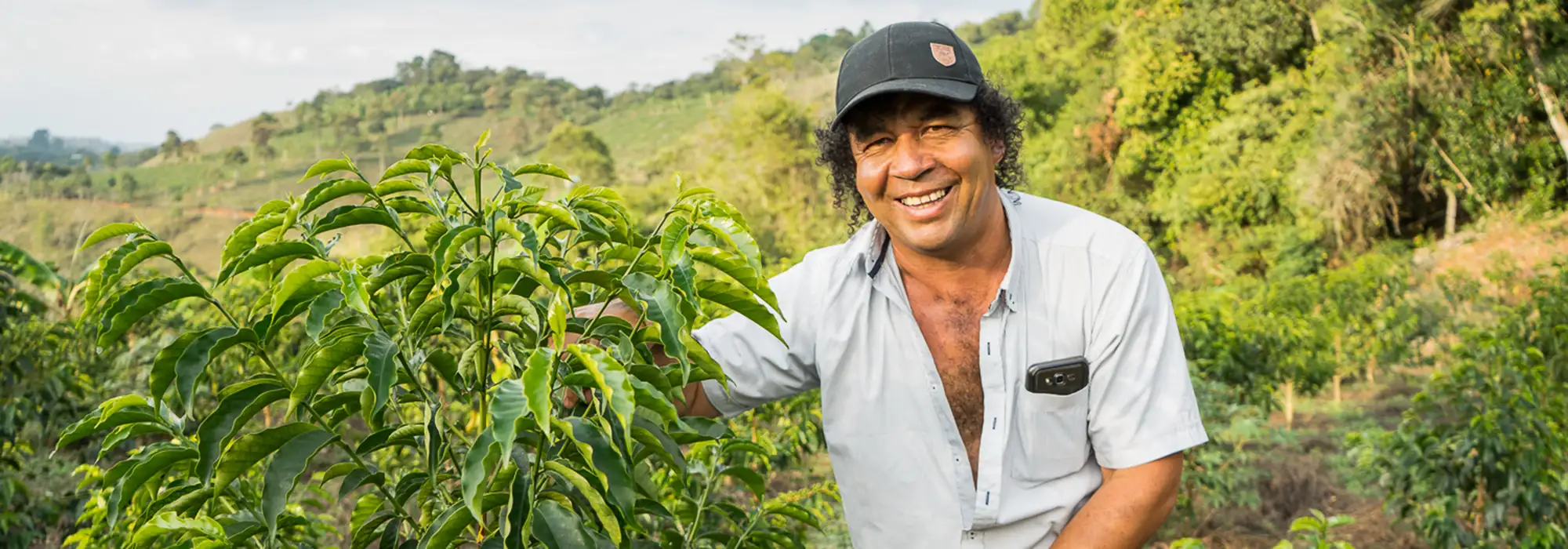
We started working with Elias Roa in 2012 and since then we have been working hard, every harvest, to improve the infrastructure at the farm as well as farming and processing practices. I first met Elias back in 2007 when I was traveling around Colombia with my friend and coffee exporter mr. Alejandro Renjifo. The aim of the trip was to find delicious coffees and potential farmers that I could work with to make sure we got a steady supply of tasty coffees from Colombia. While passing through the state of Huila I visited a small group of farmers in Acevedo that was lead by Elias. I remember we drank hot chocolate (!) and ate bread and cheese at his house and Elias gave me an impression of being a passionate and hard working farmer. Later that year I received a few samples from him but unfortunately his coffee was not meeting my quality requirements so nothing really came out of it.
Learn More About Finca Tamana
Transparency
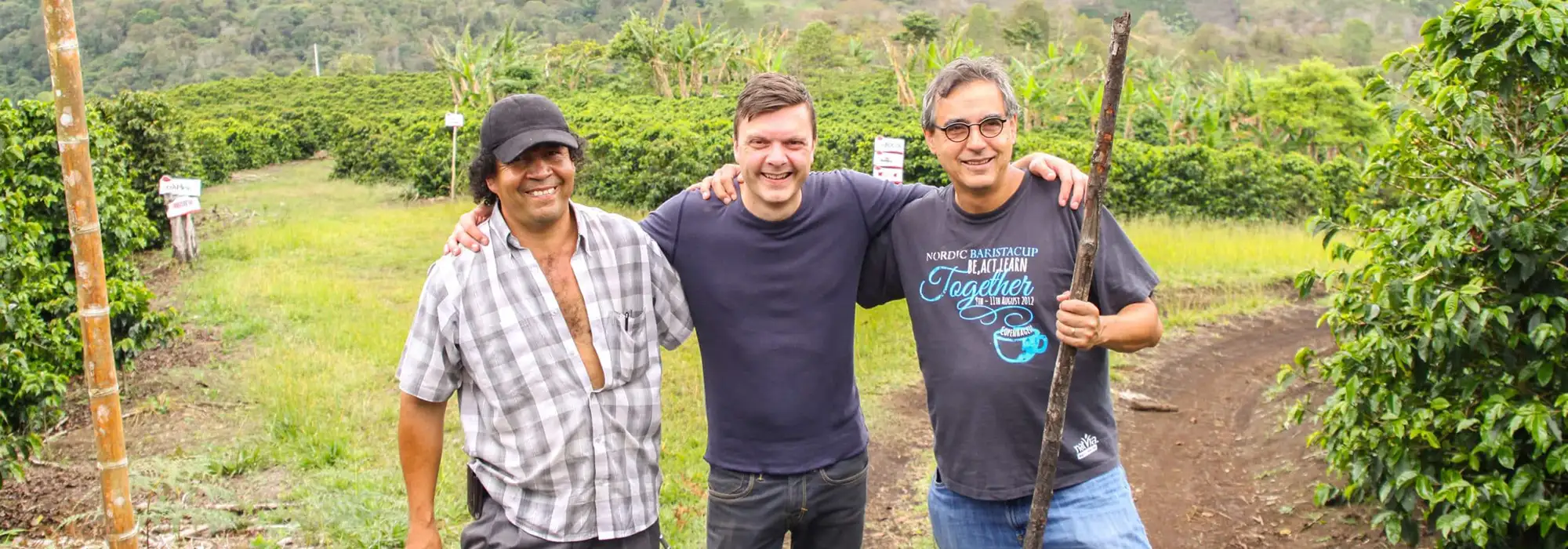
We buy coffee directly from Elias Roa, the farmer. Fairfield Trading, the exporter, provides milling and logistical service and the coffee is imported by ourselves directly to Norway.
Learn More About Transparency

